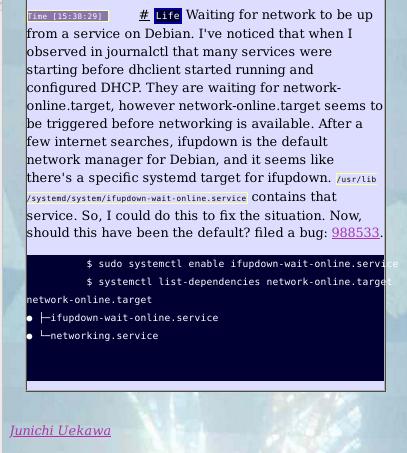


Smokescreen that serves to distract from the very racist nature of IBM and its founder
I'm something of a historian, I can't help but be troubled by the revisionist history I see unfolding in the aftermath of the recent controversy over systemd. So, from the “you are entitled to your own opinion, but not your own facts” department, as a kind of parting gift to this community, I'd like to do what I can to marshal what I perceive to be the pertinent facts into a single bucket.
Disclaimer: For the benefit of those who may stumble on this post without any knowledge of my feelings on the matter, it's safe to call me the original systemd hater. In fact, it was my own headlong flight from systemd that originally led me to Debian in the first place. (And depending on your POV, that may constitute Yet Another Reason to hate systemd.) I make no claim nor pretense to "balance" or "fairness" regarding systemd any more than I would for, say, arsenic poisoning. My aim is to challenge and hopefully dispel certain memes that I see emerging from the systemd aftermath.
With that out of the way...
Systemd is not an init system
If someone characterizes systemd as an “init system,” you may safely assume that s/he is either utterly clueless or deliberately obfuscating the discussion. Calling systemd an init system is like calling an automobile a cup holder. Not even Lennart Poettering pretends that systemd is anything but the “Core OS” (sic).
What systemd is is an effort to re-create large portions of existing userspace (including login, job scheduling, and networking, just to name a few) inside a single process traditionally reserved for the sole purpose of starting *nix userspace. (Just in case it isn't clear, there is a huge difference between starting userspace (init) and being userspace (systemd).)
At the end of the day, how one perceives this re-creation of existing userspace strongly influences one's reaction to systemd. There are plenty of perfectly legitimate reasons to be troubled by this re-invention of the wheel; they range from the philosophical and aesthetic, to the technical and mechanical, even the purely political and brutally practical.
And that's part of the problem when folks start to “debate” systemd. Very few folks have the chops to think about, much less talk about all of these areas simultaneously. As a result, the discussion becomes fractured and disjointed, in what is literally the textbook definition of bikeshedding. Suddenly, a talking head who's never written a line of code in his/her life offers up an authoritative-sounding-but-utterly-bogus opinion on systemd's maintainability. Add in the fact that folks on both sides (including Poettering himself) act as if name-calling is a perfectly good substitute for empirical evidence, and the “debate” becomes indistinguishable from white noise.
Speaking of noise...
There was never a systemd debate
Debian came late to the systemd party. Systemd has been controversial since its inception in 2010. During the intervening four years, people have fled and even forked distros over systemd. By the time Debian's GR rolled around, anyone and everyone who was going to have a strong opinion about systemd already had it. Nobody was going to change their minds, thus there was no true “debate.”
We humans love to imagine that we are rational creatures, driven by logic and reason, capable of making reasoned, optimal decisions. Which is great except what we really are is short-sighted, pig-headed, and stupid. Psychology has a boatload of experiments that demonstrate that once you get to the choose-up-sides stage, then argument becomes dramatically less effective. (Google “confirmation bias” and “backfire effect” to learn more.)
The GR was not a mandate for systemd
I have no idea where systemd fanbois get the idea that a victory lap is appropriate.
The results of the GR vote were diluted and obfuscated by two non-resolution outcomes. Of the three technologically-relevant resolutions to the GR, one was unequivocally pro-systemd, the other two were contra-systemd, differing primarily in phrasing (essentially the difference between “must not” and “should not”).
(Aside: I confess to being a “must not” guy at heart, but I grudgingly admit that those who suggest that an absolute prohibition might prove unnecessarily inflexible or self-limiting might have a valid point. Maybe. But I don't have to like doing it.)
But here's the thing, and there is just no getting around it. Once you eliminate the ass-covering "no GR required" amendment, “systemd is a bad idea, the only real question is how bad” didn't place third.
It placed first. By a substantial margin.
Conversely, “systemd is a good idea” didn't place first.
It placed last.
If this surprises you, even a little, then by all means, go look it up. And for the love of whatever you hold Sacred, refrain from uttering a single word of GR-related drivel until you do.
(Edit: My exhortation above to refrain from drivel absent sufficient research was predictably futile. So, for the benefit of those who are unable or unwilling to do the math themselves, a pre-digested version of the analysis can be found here: viewtopic.php?f=20&t=120652&p=576562#p576502)
Speaking of the GR...
The GR was too necessary
As noted above, the only reason “systemd is a bad idea” wasn't the outcome of the GR vote is because of the “political cover” amendment that allowed “This conversation is superfluous” to pretend to be the correct answer (which it absolutely isn't).
In a dichotomous, up-or-down, yes-or-no vote (aka Option1 -vs- Option3), the Debian dev community is split 60/40 (or 40/60, depending on one's POV) on the issue of systemd. When a large plurality of your engineering team tells you that you're doing something fundamentally wrong, dismissing their concerns with “we don't need no steenkin' conversation” bespeaks a complacency bordering on negligence, all the moreso when when your actions have very, very large consequences. (Google “Challenger disaster” for more information.)
Which leads me to...
Debian isn't other distros
Every time I see someone spout some variation of the bandwagon fallacy, or refer to Arch as a “major” distro, I have an urge to do harm.
News flash: There is exactly one Debian, and nothing--nothing--compares to it.
NASA doesn't run Arch. Amazon and Google don't rely on Mageia.
In terms of sheer impact on both the larger LinuxSphere and the global economy, there are exactly two “major” distros: Debian and RedHat. (SUSE is a very distant third, and everything else is just noise.)
A change in Debian affects mission-critical and life-critical software across the globe, touches literally tens of thousands of organizations, and ripples through a hundred derivatives and spinoffs.
So no, it doesn't matter, not even a little, whether your desktop machine boots a few seconds faster or “seems to work ok” under systemd. The cost of downtime on a hobbyist machine is all-but-unmeasurable, whereas the cost of downtime on a scientific supercomputer is somewhere between large and catastrophic.
Speaking of costs...
Change costs, and big change costs big
There's a reason why sysadmins in large organizations are routinely among systemd's biggest detractors.
Downtime is expensive in terms of both time and money. So is re-training. So is rewriting gigabytes of artificially-obsoleted documentation. Add them all up, factor in the associated opportunity costs, multiply by a planet's worth of installs, and before you know it, the cost to the global economy associated with systemd deployment reaches into the billions (or thousands of millions, if you prefer) of dollars/euros.
And for what exactly?
Even if systemd were a demonstrably superior technology (which it isn't), adequately spec'ed (which it isn't) elegantly designed (which it isn't), well-coded (which it isn't), properly documented (which it isn't),or developed by a responsive and responsible community with a history of delivering robust and reliable software (*cough*pulseaudio*cough*), systemd would still be at best problematic, for one simple reason: it's insanely expensive to implement, particularly given the fact that it doesn't solve any actual problem.
Insofar as I'm aware, no one has ever articulated a value proposition for systemd that addresses its implementation costs, or comes remotely close to calculating a payback period. More to the point, no one has successfully articulated any value proposition for systemd that goes beyond “it's better” or “it's more modern.”
Global warming, antibiotic resistant bacteria, oilspills, and nuclear accidents are all “modern,” but that doesn't make them good. And “better” is a meaningless term until and unless one specifies a metric or quantitative criteria that can be used to measure “better” in a systematic and reliable way. Otherwise, “new and improved!” is just marketing hype.
At the end of the day, the crux of the systemd question comes down to a matter of how much Unix one wants in one's Linux. Casual users and hobbyists probably won't care. Professionals will care deeply and passionately. ⬆